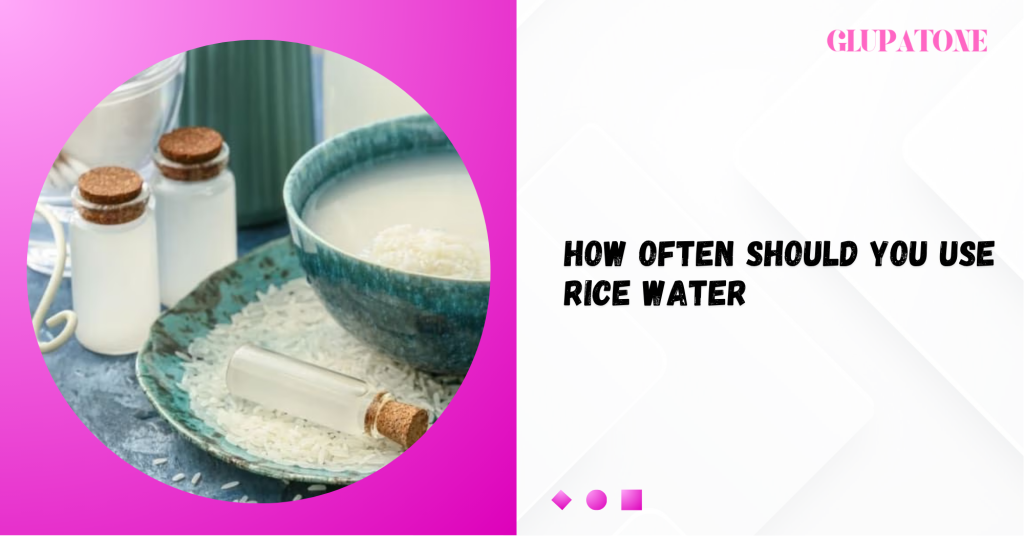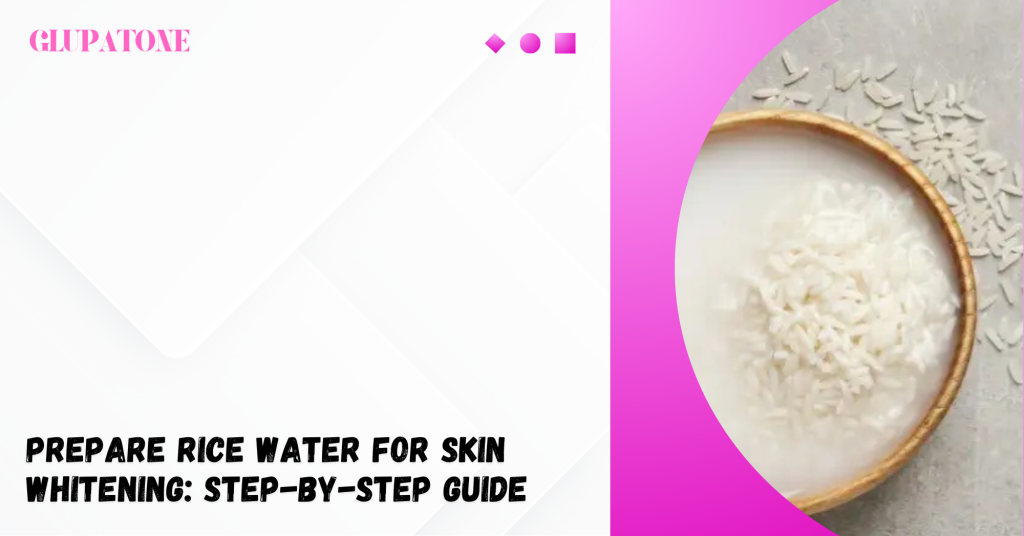Introduction to Rice Water in Skincare
Rice Water for Skin Whitening has been a hidden gem in skincare for centuries, especially in Asian beauty traditions. It’s valued for its ability to refresh, smoothen, and brighten the skin naturally—without harsh chemicals.
What Is Rice Water?
Rice water is the starchy liquid left behind after soaking or boiling rice. This cloudy substance is rich in amino acids, antioxidants, and minerals, making it a nourishing treatment for the skin.
History and Traditional Use in Beauty
In Japan, women from the Heian period used rice water to keep their hair and skin youthful. In Korea and China too, rice rinses have long been part of holistic skincare routines. Today, it’s making a comeback globally for its brightening properties.
How Rice Water Helps Brighten Skin
Rice water isn’t just a trend—it actually contains skin-repairing and lightening compounds that help even out your tone and reduce dullness.
Natural Compounds for Whitening
It’s packed with ferulic acid, niacin (vitamin B3), and allantoin—all of which contribute to reducing dark spots and evening skin tone naturally.
Effects on Pigmentation and Skin Tone
Regular use helps fade pigmentation caused by sun damage, acne scars, or age. It promotes a more radiant, even complexion over time.
Rice Water vs. Glupatone: Which Works Better?
Rice water is great for gentle, gradual lightening, but Glupatone delivers clinically formulated results faster. While rice water nourishes the skin, Glupatone combines glutathione, kojic acid, and vitamin C—proven agents that actively reduce melanin production.
Using Glupatone and Rice Water Together
Want the best of both worlds? Many users find excellent results by applying Glupatone emulsion after toning with rice water. This layering method lets rice water hydrate and prep the skin, while Glupatone gets to work on deep pigmentation.
How to Prepare Rice Water for Skin Whitening
The preparation method can affect the concentration of nutrients and how your skin responds. Below are three popular methods to try.
Soaking Method
Rinse a handful of uncooked rice, then soak it in 1 cup of clean water for 30 minutes. Stir occasionally. Strain the water into a clean container—this is your rice toner, ready to use.
Boiling Method
Boil ½ cup of rice with 1½ cups of water. Once cooked halfway, strain out the starchy water and cool it. This method creates a more concentrated solution, great for masks or scrubs.
Fermented Rice Water: What It Is and How to Make It
After soaking rice, let the strained water sit in a covered jar at room temperature for 24–48 hours until it slightly sours (a sign of fermentation). This boosts its antioxidant levels and skin-penetrating ability.
Which Method Is Most Effective?
Fermented rice water is the most potent in terms of antioxidant activity. However, if you have sensitive skin, start with the soaking method to avoid potential irritation.
Beauty That Reflects You—Brighten Naturally with Glupatone.
Target Hyperpigmentation at Its Core—Glupatone Does the Work While You Glow!
Best Ways to Use Rice Water on Skin
Now that your rice water is ready, let’s talk about how to make the most of it in your skincare routine.
As a Face Toner
Soak a cotton pad in the water and gently wipe your face after cleansing. This helps tighten pores and brighten dull skin. Let it dry naturally before layering any creams.
Rice Water Sheet Mask
Soak a dry sheet mask or clean cloth in rice water and place it on your face for 15–20 minutes. This hydrates deeply and leaves skin glowing.
Rice Water and Glupatone Combo Application
Apply rice water as a toner, wait 2–3 minutes, then layer Glupatone emulsion or cream over it. This combo delivers hydration plus whitening actives, improving skin tone faster.
How Long to Leave It On
Leave rice water-based treatments on for 15–20 minutes, then rinse (unless using as a toner, which can stay on). Follow with moisturizer or Glupatone for best results.

How Often Should You Use Rice Water?
Consistency is key when using rice water for skin whitening, but how often you should apply it depends on your skin type and sensitivity.
Frequency Based on Skin Type
- Oily or Acne-Prone Skin: 3–4 times a week to control excess oil and brighten skin gradually.
- Dry or Sensitive Skin: 1–2 times a week is ideal to prevent irritation or dryness.
- Normal to Combination Skin: 2–3 times a week offers a balanced approach for maintenance and glow.
Overuse may cause dryness in some people, so always monitor your skin’s response.
When to Apply for Best Results
The best time to apply rice water is in the evening, after cleansing your face. Nighttime allows your skin to absorb nutrients without interference from sun or pollution. It can also be used in the morning as a refreshing toner, but always pair it with sunscreen.
Combining Rice Water with Glupatone Products
Pairing natural remedies with clinically-formulated products like Glupatone can give your skin the boost it needs to achieve a healthy, even glow.
Layering Tips with Glupatone Emulsion or Cream
After toning your face with rice water, allow your skin to air-dry completely. Then, apply Glupatone Emulsion or Cream evenly across the skin. This sequence ensures rice water prepares the skin while Glupatone delivers active whitening ingredients such as Glutathione, Kojic Acid, and Vitamin C.
For daytime routines, follow with sunscreen to protect and preserve results.
Skin Types That Benefit Most from the Combo
- Dull, uneven skin tone: Brightens and boosts clarity
- Pigmented or sun-damaged skin: Helps fade spots and improves texture
- Oily or acne-prone skin: Balances sebum and helps reduce dark scars
If your skin is extremely dry or highly sensitive, always test both products individually before combining them.
Things to Avoid During Use
- Avoid using harsh exfoliants or scrubs right before or after applying rice water or Glupatone.
- Don’t use lemon juice or other acidic ingredients in the same routine to prevent over-sensitization.
- Never store rice water longer than 5–7 days—even in the fridge—as it can spoil.
Expected Results and Timeline
Results from rice water and Glupatone vary based on consistency and skin condition, but many users begin to notice a healthier glow within a few weeks.
How Long It Takes to See Skin Brightening
- With Rice Water Alone: 2–4 weeks of consistent use for mild improvements.
- With Glupatone Combo: 1–2 weeks for visible tone correction and clarity (especially with regular day/night application).
Glupatone with Homeo Cure accelerates visible results due to its strong formulation, while rice water provides gentle, supportive care.
Signs It’s Working for Your Skin
- Skin feels smoother and more hydrated
- Gradual fading of dark spots and pigmentation
- A more even, radiant complexion
- Reduced dullness or tired skin appearance
If you experience redness, dryness, or itching, stop use and consult a skincare professional.
Safety Tips and Precautions
While rice water is a gentle and widely used natural remedy, it’s still important to take the right precautions—especially when combining it with other skincare products like Glupatone.
Patch Testing Before Use
Before applying rice water (especially fermented versions) or mixing it with Glupatone, always perform a patch test:
- Apply a small amount behind your ear or on your jawline.
- Wait 24 hours to check for redness, itching, or irritation.
This helps ensure your skin reacts safely—especially if it’s sensitive or acne-prone.
When to Avoid Rice Water on Skin
- If you have eczema, active acne inflammation, or highly sensitive skin, rice water may cause flare-ups.
- Avoid using it on broken or peeling skin.
- Discontinue use if you notice tightness, flaking, or persistent redness.
Importance of Sunscreen with Whitening Routines
Any skin-brightening product—natural or clinical—can increase your skin’s sensitivity to UV rays. Whether you use Glupatone, rice water, or both, always:
- Apply a broad-spectrum sunscreen (SPF 30 or higher) daily.
- Reapply every 2 hours when outdoors.
Sunscreen preserves your results and prevents new pigmentation from forming.
Illuminate Your Beauty—Start Your Skin Brightening Journey with Glupatone.
Reveal a Brighter, More Radiant You—Experience Glupatone Today!
Conclusion: Is Rice Water an Effective Natural Whitening Agent?
Rice water offers a gentle, affordable, and traditional approach to achieving a more even-toned, radiant complexion. Its natural compounds like ferulic acid and allantoin support skin renewal, reduce pigmentation, and calm inflammation.
However, for faster and more noticeable results, pairing rice water with a dermatologist-approved formula like Glupatone can offer the best of both worlds:
- Glupatone delivers clinically balanced whitening ingredients like Glutathione and Vitamins that are good for Skin.
- Rice water supports hydration and enhances your skin’s natural glow.
Reminder: Always consult a dermatologist or skincare specialist before starting any new brightening regimen, especially when combining natural and clinical products like Glupatone.
Frequently Asked Questions (FAQs)
Can I use rice water every day for whitening?
Yes, but daily use is best suited for normal or oily skin. Dry or sensitive skin may benefit more from 2–3 times a week.
Does fermented rice water work better?
Fermented rice water has stronger antioxidants and may offer better results, but it also carries a higher risk of irritation. Always patch test first.
Can men use rice water for skincare?
Absolutely. Rice water benefits all skin types and genders, including men’s skin, which can be thicker or oilier.
Is it safe to mix rice water with Glupatone?
Yes, you can use rice water as a toner before applying Glupatone emulsion or cream. Just ensure both are suitable for your skin and apply sunscreen daily.
What’s the best time to apply rice water on the skin?
Evening is ideal, followed by Glupatone and moisturizer. This allows the skin to rest and repair overnight.
Read More:

